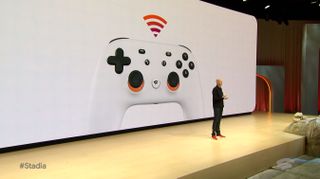The heart of Google's Stadia tech is now being licensed out
Not the future Google once envisaged.

Updated 03/25/22: This article originally said Stadia was now a B2B service, which is incorrect. Stadia remains a consumer service, and the article concerns the B2B-facing side of the technology. We also corrected an erroneous reference to Stadia 'devices' and clarified the service still offers exclusive titles.
Google Stadia was once, apparently, the future. Google itself declared it "alive and well" in May last year after, in February, announcing it would be licensing the tech out to "industry partners." Last month we reported that Google was planning to turn it into a white-label streaming platform (one licensed by businesses and used under their own branding), a strategy known internally as Google Stream (which was one of the prototype names for Stadia).
Now it's official. At the 'Google for Games Developer Summit' the company announced that it's going to sell the underlying tech as a Google Cloud service called... 'Immersive Stream for Games' (thanks, ArsTechnica). I didn't think Stadia was that great a name but that's one heck of a mouthful: of course, that's the name for the B2B service rather than the side which is still trying to attract consumers.
The keynote showed a presentation of Batman: Arkham Knight running on AT&T mobile devices, showing that there's no longer any Stadia or even Google branding. Google obviously has the scale that this could be an attractive proposition for some companies: when the reports started flying around about this pivot, Bungie and Capcom were rumoured as being interested in using the tech for their own purposes.

Google being Google it is also aiming wider than the obvious: Another client announced last year was the fitness-bike maker Peloton, with a game called 'Lanebreak' getting a closed demo.
It's a strange turn for Stadia, which arrived with big promises and a promise to shake-up the traditional hardware market. A disappointing lineup of titles and a muddled approach to pricing saw a lukewarm consumer response, and Stadia never seemed to break through or find any big advocates for its approach. Google's own target was 1 million subscribers by the end of 2020: a target it missed by around 25%, with one insider saying "retention was a real problem".
A Business Insider report from earlier this year cited current and former employees estimating that "about 20% of the focus was on the consumer platform" and the rest is selling the tech and "proof-of-concept work for Google Stream."
The biggest gaming news, reviews and hardware deals
Keep up to date with the most important stories and the best deals, as picked by the PC Gamer team.
The Stadia service remains a going concern, even if not quite what it was once promised to be. Firstparty titles remain "out of the question", though Stadia does have some exclusives, and Google says the service will see 100+ games this year: as well as new features like click-to-play trials. So if you use the Stadia service, don't expect it to suddenly shut down: but don't expect a great comeback, either.
Rich is a games journalist with 15 years' experience, beginning his career on Edge magazine before working for a wide range of outlets, including Ars Technica, Eurogamer, GamesRadar+, Gamespot, the Guardian, IGN, the New Statesman, Polygon, and Vice. He was the editor of Kotaku UK, the UK arm of Kotaku, for three years before joining PC Gamer. He is the author of a Brief History of Video Games, a full history of the medium, which the Midwest Book Review described as "[a] must-read for serious minded game historians and curious video game connoisseurs alike."
Most Popular






